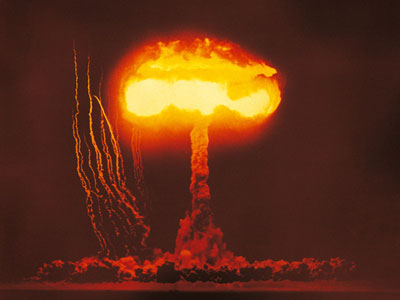For 1954, we’re discussing the first vampire/zombie apocalypse in a series, Richard Matheson’s I Am Legend. This is a significant subgenre in End of the World fiction, and it reflects the nebulous boundary between horror and science fiction that has been fruitfully occupied by Wells, Lovecraft, Mary Shelley, and many others. If you’ve seen the Will Smith movie version, you know that I Am Legend combines zombie horror with a hard-headed, scientific protagonist like those we encountered in Genus Homo. I Am Legend is significant in our survey of post-apocalyptic fiction because a key aspect of the book is the idea that nature, even at its most catastrophic and bizarre, is never inexplicable - scientific reasoning always gets to the bottom of the mystery.
 Matheson is one of the better stylists I’ve encountered in my post-apocalyptic survey so far. His writing exhibits an affinity to the terse prose of Hemingway and the hard-boiled tone of Raymond Chandler’s detective stories. The style is well-suited to this scientific vampire thriller. Robert Neville is a lone survivor of a plague that turned everyone into vampires and zombies. (There is a distinction between the two here, because some victims of the plague are reanimated dead, while others never died. They all avoid sunlight during the day and come out at night, searching for blood.)
Matheson is one of the better stylists I’ve encountered in my post-apocalyptic survey so far. His writing exhibits an affinity to the terse prose of Hemingway and the hard-boiled tone of Raymond Chandler’s detective stories. The style is well-suited to this scientific vampire thriller. Robert Neville is a lone survivor of a plague that turned everyone into vampires and zombies. (There is a distinction between the two here, because some victims of the plague are reanimated dead, while others never died. They all avoid sunlight during the day and come out at night, searching for blood.)Somehow, Neville was immune to this plague, but it took down both his wife and daughter. In his Los Angeles neighborhood, he’s surrounded by former neighbors who are now vampires that come out each night and assault his heavily fortified house. By day, when the vampires are asleep, Neville goes vampire hunting, killing as many of them as possible. At night, he locks himself in, turns up his record player, and drowns his depression with whiskey.
Eventually, Neville realizes that hard drinking isn’t getting him anywhere, and if he’s going to live this way he might as well just kill himself or give up to the vampires. Instead of giving up, he lets his rational mind kick in, and he sets out to solve the mystery of the zombie plague. The supernatural isn’t a possible explanation - there has to be a scientific explanation for reanimated dead and vampire behavior, and Neville is going to find it.
 Like other 1950’s post-apocalyptic works, hard-headed, scientific rationality goes hand in hand with mental and physical discipline, something that is obviously quite handy in a catastrophically changed world. Neville pulls himself together and learns that the source of the plague is a bacterial infection - just how that works is so hokey it’s not worth explaining here; it’s about as plausible as the movie version. Plausibility isn’t the issue however, and it doesn’t detract from the story. The point is that even under the most mind-blowing circumstances, a dogged adherence to the scientific method pays off and that all phenomena of this world have a fundamentally natural explanation. Matheson’s pairing of Neville’s rugged survivalism with his ruthlessly rational search for an explanation for the bizarre plague is one of the most compelling aspect of the book.
Like other 1950’s post-apocalyptic works, hard-headed, scientific rationality goes hand in hand with mental and physical discipline, something that is obviously quite handy in a catastrophically changed world. Neville pulls himself together and learns that the source of the plague is a bacterial infection - just how that works is so hokey it’s not worth explaining here; it’s about as plausible as the movie version. Plausibility isn’t the issue however, and it doesn’t detract from the story. The point is that even under the most mind-blowing circumstances, a dogged adherence to the scientific method pays off and that all phenomena of this world have a fundamentally natural explanation. Matheson’s pairing of Neville’s rugged survivalism with his ruthlessly rational search for an explanation for the bizarre plague is one of the most compelling aspect of the book.I won’t give away more of the plot here, because even if you’ve seen the movie, you’ve missed the really big twist that turns Neville’s view of himself completely on its head. The end of the book does turn to the common post-apocalyptic theme of human impermanence - life on Earth will go on, even in the absence of humans. I Am Legend is an excellent zombie holocaust based on two key 1950’s sci-fi themes: science is a disciplining force, and nature is fundamentally explicable.
Next up in our end of the world survey: Leigh Brackett's 1955 story of post-nuclear holocaust Mennonites, The Long Tomorrow.

Read the feed:





Comments